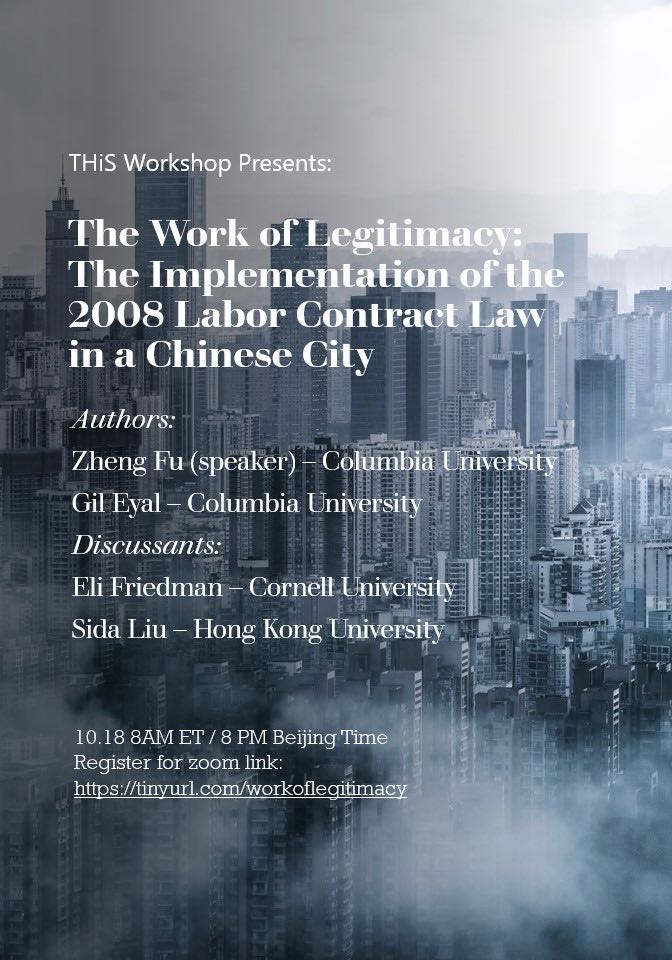THiS Workshop of Chinese Societies (2024 Fall)


We are excited to announce the Winter schedule of THiS Workshop of Chinese Societies (WOCS). THiS WOCS provides a virtual platform for scholars who use qualitative/mixed methods to study Chinese societies to present and discuss their ongoing projects.
At THiS WOCS, we discuss research that advances the sociological understanding of contemporary & historical Chinese societies, broadly defined. We welcome presentations using ethnography, interview, comparative-historical methods, network analysis, computational methods, etc.

October Workshop
The Work of Legitimacy: The Implementation of the 2008 Labor Contract Law in a Chinese City
Speaker: Zheng Fu, Ph.D. Candidate, Department of Sociology, Columbia University
Discussants: Sida Liu, Law School and Department of Sociology, University of Hong Kong; Eli Friedman, Department of Sociology, Cornell University.
Moderator: Yimang Zhou, Department of Sociology, Renmin University of China.
Time: October 18th, 8:00 AM (Eastern Time)/ October, 8:00 PM (Beijing Time)
Zoom Link: https://tinyurl.com/workoflegitimacy
Abstract
What makes a law legitimate? How is compliance with new legislation achieved? This article suggests that answers to these questions require analyzing the “work of legitimacy,” namely the actors and practices involved in implementing the law and tasked with persuading social actors to comply with it. We argue that ANT’s concept of “translation” offers a useful model for analyzing the work of legitimacy, specifically how the interests of relevant social actors are translated so that compliance with the law becomes intelligible as a means of pursuing their own interests. Additionally, we argue that the social actor performing the work of legitimacy is not pre-given, but forms itself in and through the work of weaving a network across the boundary between state and society. We demonstrate the utility of this approach by examining the legitimization process of the 2008 labor law reform in one Chinese locality, Waterfront District in Pearl River Delta (PRD). We show how a loose coalition of local state officials, former officials, social organizations and labor lawyers translated the interests of large employers and managers to accord with the “public employment relations service” they offered, and thus harnessed them into compliance with the labor law.
December Workshop
Chinese American or American Chinese?: WeChat and the Hybrid Identity of Chinese Immigrants in the U.S.
Speaker: Jingsi Christina Wu, Associate Professor of Journalism, Media Studies, and Public Relations, Hofstra University
Discussants: Zai Liang (Distinguished Professor, Department of Sociology, University at Albany - SUNY); Wanning Sun (Professor, Media and Communication Studies, University of Technology Sydney)
Moderator: Zhifan Luo (Assistant Professor, Sociology and Anthropology, Concordia University)
Time: December 4, Wednesday, at 8 PM (ET)/ December 5, Thursday, at 9 AM (Beijing)
Zoom Link: https://concordia-ca.zoom.us/j/89519076322?pwd=7HmO2IfDPlNrAIR2eb2zuecRMnyheN.1
Abstract
Immigration research in the West has been primarily informed by a more traditional perspective of assimilation, which projects a linear and unitary process in which immigrants ultimately integrate into the host society in their pursuit of a new better life, versus one of a less straightforward path. In this work, I apply such alternative theories as segmented assimilation theory and differential adaptation to my examination of WeChat’s rise in the world’s ever more hybrid ethnic media landscape, specifically in the U.S. As diasporic media are no longer limited to traditional platforms but have permeated into the new frontier of social media, recent Chinese immigrants are able to consolidate their information gathering both about China and about their new life in the U.S., as well as a majority of their communication needs, all on this pervasive social media app that is WeChat. As a result, there is a heightened sense of “in-between-ness” (Sun, 2021) for Chinese immigrants’ assimilation process, which defies the traditional prescription of a linear process in which immigrants abandon their home culture and become more “Americanized” in the American context. Indeed, Zhou (2009) observes “trends of ethnic revival” in that recent Chinese immigrants more intentionally and manifestly hold on to their cultural heritage in the process of establishing a new life for themselves and their families. While Zhou’s observations were made before WeChat’s inception, I extend that line of historical trend and engage with Sun’s “in-between-ness” or “flexible citizenship” (Ong, 1999), as well as the distinction between assimilation and adaptation, in this work. Through my interviews with recent Chinese immigrants who moved to the U.S. to more upper-middle-class lives than former generations of immigrants and my analysis of articles circulated on WeChat, I investigate the hybrid role WeChat plays in Chinese immigrants’ hybrid identity formation. On the one hand, such ethnic social media platforms as WeChat allow Chinese immigrants to adapt to their new life without abandoning their ethnic identity, more so than ever before. Some would argue that the infrastructure created through WeChat allows contemporary Chinese immigrants to adapt to their new life more successfully by offering more information networks, life opportunities, and emotional support than ever before. On the other hand, my interviews point to tensions in their identity formation and the desire to move beyond ethnic networks of information and connection. As Chinese immigrants continue to tap into the convergence of informational, social, and national frameworks with the aid of WeChat, they also increasingly grapple with a continuously shifting and realigned sense of identity.
